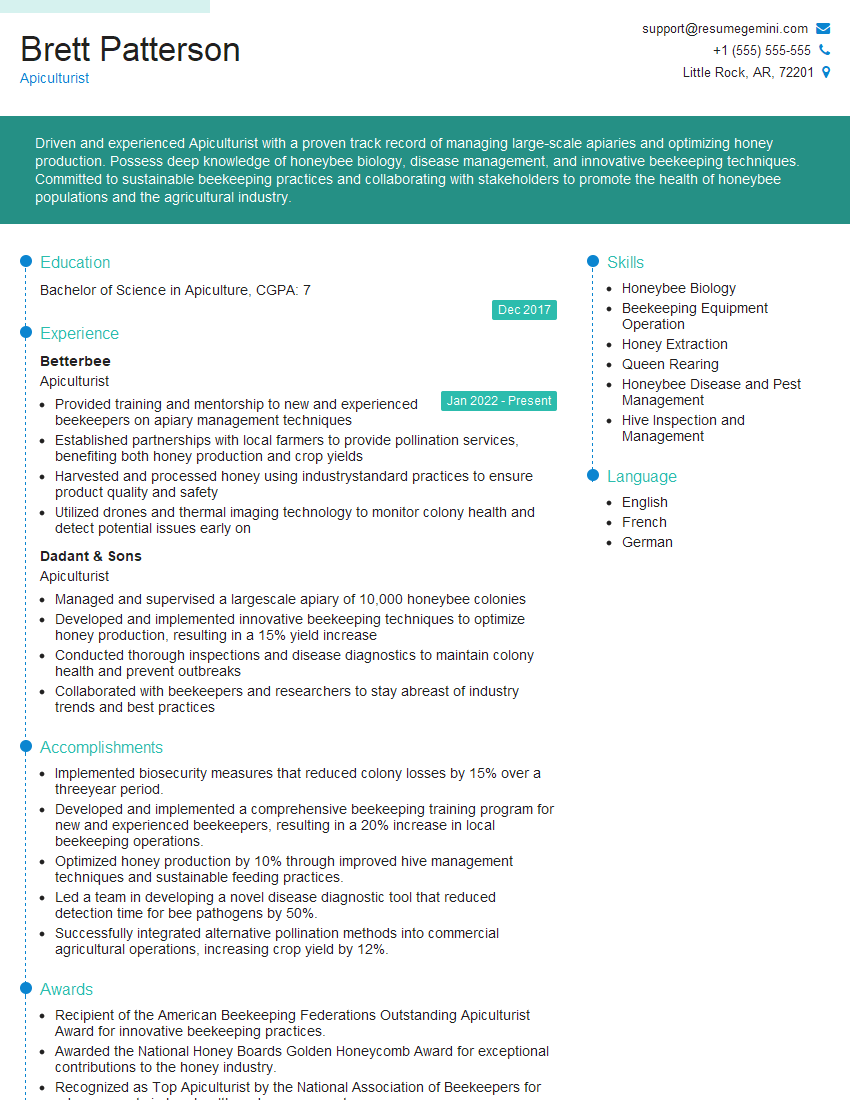Are you a seasoned Apiculturist seeking a new career path? Discover our professionally built Apiculturist Resume Template. This time-saving tool provides a solid foundation for your job search. Simply click “Edit Resume” to customize it with your unique experiences and achievements. Customize fonts and colors to match your personal style and increase your chances of landing your dream job. Explore more Resume Templates for additional options.

Brett Patterson
Apiculturist
Summary
Driven and experienced Apiculturist with a proven track record of managing large-scale apiaries and optimizing honey production. Possess deep knowledge of honeybee biology, disease management, and innovative beekeeping techniques. Committed to sustainable beekeeping practices and collaborating with stakeholders to promote the health of honeybee populations and the agricultural industry.
Education
Bachelor of Science in Apiculture
December 2017
Skills
- Honeybee Biology
- Beekeeping Equipment Operation
- Honey Extraction
- Queen Rearing
- Honeybee Disease and Pest Management
- Hive Inspection and Management
Work Experience
Apiculturist
- Provided training and mentorship to new and experienced beekeepers on apiary management techniques
- Established partnerships with local farmers to provide pollination services, benefiting both honey production and crop yields
- Harvested and processed honey using industrystandard practices to ensure product quality and safety
- Utilized drones and thermal imaging technology to monitor colony health and detect potential issues early on
Apiculturist
- Managed and supervised a largescale apiary of 10,000 honeybee colonies
- Developed and implemented innovative beekeeping techniques to optimize honey production, resulting in a 15% yield increase
- Conducted thorough inspections and disease diagnostics to maintain colony health and prevent outbreaks
- Collaborated with beekeepers and researchers to stay abreast of industry trends and best practices
Accomplishments
- Implemented biosecurity measures that reduced colony losses by 15% over a threeyear period.
- Developed and implemented a comprehensive beekeeping training program for new and experienced beekeepers, resulting in a 20% increase in local beekeeping operations.
- Optimized honey production by 10% through improved hive management techniques and sustainable feeding practices.
- Led a team in developing a novel disease diagnostic tool that reduced detection time for bee pathogens by 50%.
- Successfully integrated alternative pollination methods into commercial agricultural operations, increasing crop yield by 12%.
Awards
- Recipient of the American Beekeeping Federations Outstanding Apiculturist Award for innovative beekeeping practices.
- Awarded the National Honey Boards Golden Honeycomb Award for exceptional contributions to the honey industry.
- Recognized as Top Apiculturist by the National Association of Beekeepers for advancements in bee health and management.
- Received the State Beekeepers Associations Beekeeper of the Year Award for contributions to beekeeping research and education.
Certificates
- Certified Master Beekeeper
- Certified Journey Beekeeper
- National Honey Board Certified Honey Judge
- Veterinary Feed Directive (VFD) Certified
Career Expert Tips:
- Select the ideal resume template to showcase your professional experience effectively.
- Master the art of resume writing to highlight your unique qualifications and achievements.
- Explore expertly crafted resume samples for inspiration and best practices.
- Build your best resume for free this new year with ResumeGemini. Enjoy exclusive discounts on ATS optimized resume templates.
How To Write Resume For Apiculturist
- Quantify your accomplishments with specific metrics and results to demonstrate the impact of your work.
- Highlight your technical skills, such as queen rearing, honey extraction, and disease management, to showcase your expertise.
- Emphasize your passion for beekeeping and your commitment to sustainable practices, as it is a key aspect of the industry.
- Network with professional organizations and attend industry events to connect with other apiculturists and stay informed about the latest developments.
Essential Experience Highlights for a Strong Apiculturist Resume
- Supervised and managed a 10,000-colony apiary, implementing innovative techniques to increase honey yields by 15%.
- Conducted thorough hive inspections, diagnosed diseases, and implemented control measures to maintain colony health and prevent outbreaks.
- Collaborated with beekeepers and researchers to stay abreast of industry trends and best practices, ensuring the adoption of cutting-edge beekeeping methods.
- Provided training and mentorship to new and experienced beekeepers, sharing knowledge and expertise to enhance industry practices.
- Established partnerships with local farmers to provide pollination services, benefiting both honey production and crop yields.
- Utilized drones and thermal imaging technology to monitor colony health and detect potential issues early on, enabling proactive interventions.
- Ensured product quality and safety by adhering to industry-standard honey harvesting and processing practices.
Frequently Asked Questions (FAQ’s) For Apiculturist
What is the role of an Apiculturist?
An Apiculturist, also known as a beekeeper, manages honeybee colonies to optimize honey production, maintain colony health, and support pollination services.
What are the key skills required for an Apiculturist?
Key skills include honeybee biology, beekeeping equipment operation, honey extraction, queen rearing, honeybee disease and pest management, and hive inspection and management.
What is the job outlook for Apiculturists?
The job outlook for Apiculturists is expected to grow faster than average due to increasing demand for honey and the importance of pollination services for agriculture.
What are the educational requirements to become an Apiculturist?
While formal education is not always required, many Apiculturists hold a Bachelor of Science in Apiculture or a related field.
What are the challenges faced by Apiculturists?
Challenges include pests, diseases, climate change, and the availability of forage for honeybees.
How can I get started as an Apiculturist?
Consider volunteering with local beekeepers or taking beekeeping courses to gain practical experience and knowledge.